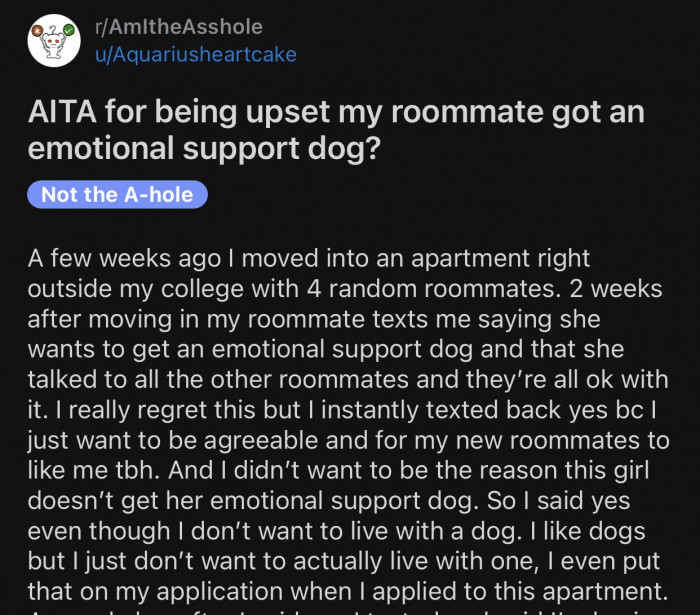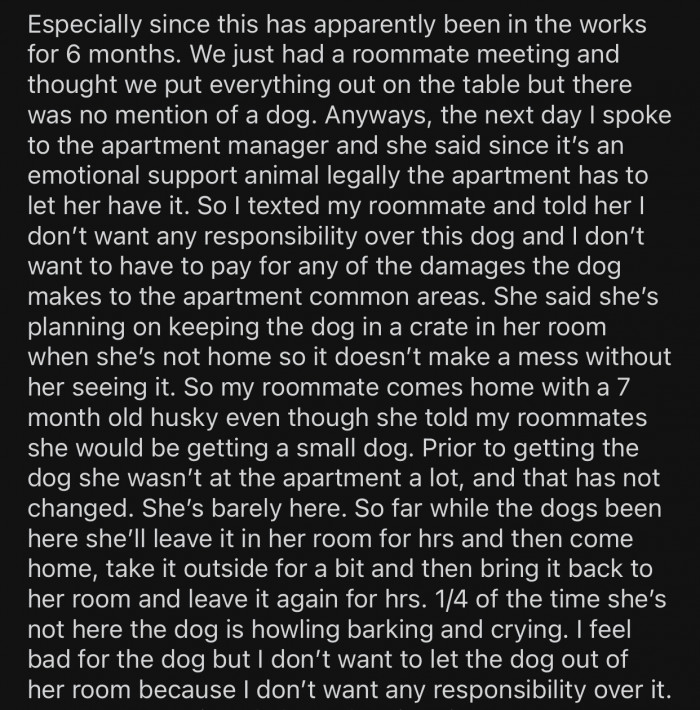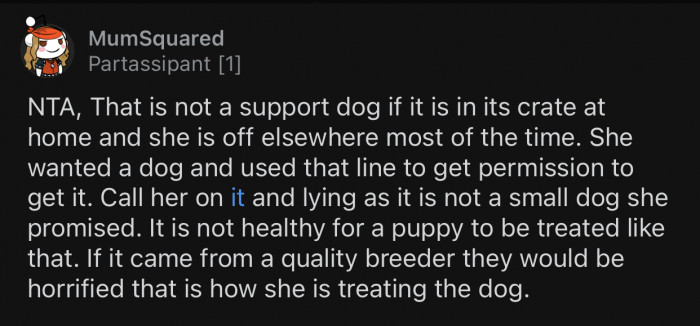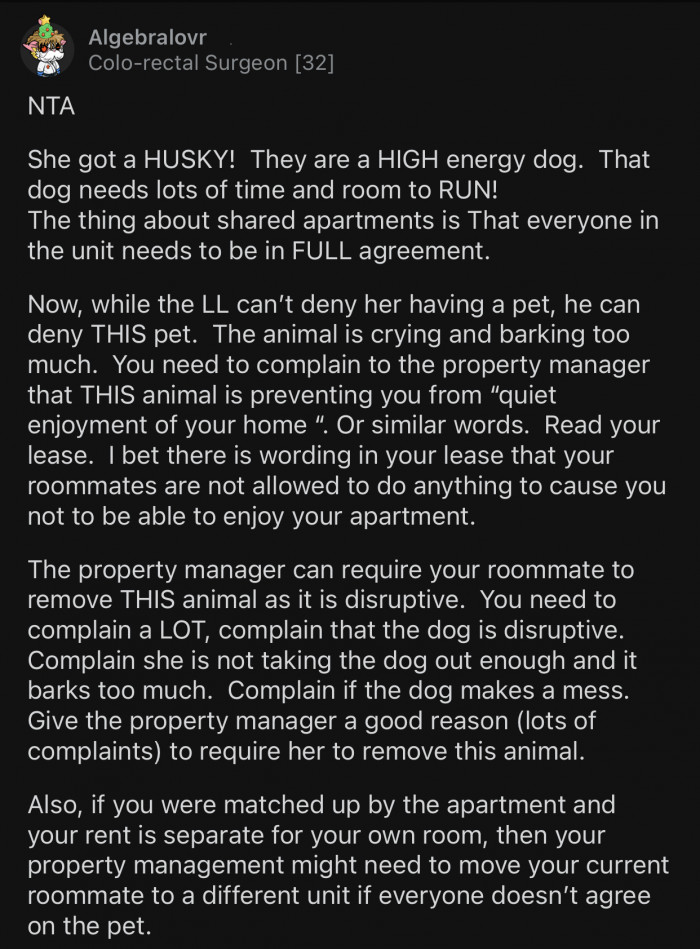Redditor Upset After Roommate Gets An Emotional Support Dog That She Mostly Keeps In A Crate
The world and all the dangers it presents can be a pretty stressful place. Most of us periodically or constantly feel overwhelmed by life's worries and troubles.
Pets are a great source of comfort for many people. They help individuals cope with the overwhelming feelings of their everyday lives and serve as wonderful companions.
Contrary to popular belief, an Emotional Support Dog (ESD) is far from an ordinary pet. The love and devotion that dogs provide help individuals who suffer from mental illness navigate their way through any struggles that might arise unexpectedly.
Individuals who wish to have an Emotional Support Dog need to qualify and their dogs need to be "certified" as well. The process is conducted through a licensed therapist.
A Redditor who goes by the username u/Aquariusheartcake made a post on the r/AmItheA**hole subreddit, where they asked the community whether they were in the wrong for being upset that their roommate got an emotional support dog.
The user received many interesting replies to their post. Scroll down to check out the full Reddit post, and scroll a little further to read the comments from the original post.
Here's the original Reddit post by u/Aquariusheartcake:

OP started having doubts about the whole situation and tried to find a solution.

OP did not approve of the way their roommate was treating her dog.

The Importance of Emotional Support Animals
Emotional support animals (ESAs) play a vital role in the lives of those coping with mental health challenges.
Research in clinical psychology indicates that having an ESA can reduce feelings of anxiety and depression, providing a sense of companionship and stability.
However, in situations where an ESA is kept in a crate, the effectiveness of that support can be diminished.
Understanding Emotional Support Animals
Dr. Samantha Reed, a psychologist specializing in animal-assisted therapy, explains that emotional support animals can provide significant psychological benefits for their owners.
However, when these animals are kept in restrictive environments, it can lead to distress for both the animal and the owner.
Research indicates that animals thrive in environments where they can interact freely with their surroundings and their owners.
OP and their roommates did not know how to deal with the situation they found themselves in.

Here's how the Reddit community reacted to u/Aquariusheartcake's post:

Huskies require a lot of attention and exercise.

Behavioral studies show that animals require interaction and stimulation to thrive, which impacts their emotional health and well-being.
Keeping a dog in a crate for extended periods can lead to feelings of neglect and anxiety in the animal, which can, in turn, create stress for the owner.
Understanding this dynamic can help roommates navigate responsibilities related to pet care.
According to studies published in the Journal of Clinical Psychology, emotional support animals can reduce anxiety and improve overall well-being.
Yet, when these animals are confined, it can lead to feelings of guilt and helplessness for the owner, creating a cycle of distress.
This dynamic needs to be addressed to ensure that both the animal's and owner's mental health are supported.
Huskies might act out despite getting enough stimulation.

OP should have been honest from the beginning.

It was odd that OP's roommate asked only an hour before.

Addressing Feelings of Guilt and Responsibility
The situation highlights a common internal conflict regarding responsibility for another living being.
Psychologists note that individuals often experience guilt when they perceive they are unable to meet the needs of an animal.
This guilt can lead to avoidance behaviors, as seen in the roommate's reluctance to take responsibility for the dog.
Navigating Responsibility in Pet Ownership
Behavioral psychologists emphasize the importance of understanding the responsibilities that come with pet ownership.
Dr. John Smith, an expert in pet therapy, suggests that owners must create a balance between their needs and the needs of their pets.
Establishing clear boundaries around pet care can help reduce feelings of overwhelm and resentment.
OP should document the whole ordeal.

OP could ask to see some paperwork.

Some people do it to avoid a pet fee.

To alleviate feelings of guilt and improve the dog's situation, open communication between roommates is crucial.
Research in interpersonal communication supports the idea that discussing feelings and responsibilities can lead to better understanding and cooperation.
By setting clear expectations about pet care, both roommates can work together to ensure the dog receives the attention it needs.
Encouraging the owner to seek support from friends or professionals can help alleviate feelings of guilt associated with their pet's well-being.
Support groups or pet care classes can provide valuable resources for managing the responsibilities of pet ownership.
Finding a balance between personal needs and pet care is vital for maintaining a healthy relationship.
There's a difference between emotional support animals and trained support animals.

You can simply get a certificate online.

Some online certifications are total scams.

Enhancing the Well-Being of Pets
Providing a proper environment for pets is essential for their overall well-being.
Studies show that regular exercise, socialization, and mental stimulation are critical components of a dog's happiness.
Implementing a routine that includes these elements can help mitigate feelings of anxiety, both for the dog and its owners.
The Psychological Impact of Pet Ownership
Research has shown that pets can serve as a source of emotional support, especially during challenging times.
Dr. Lisa White, a psychologist, highlights that the bond between humans and animals can offer comfort and companionship.
However, when pets are not adequately cared for, it can lead to feelings of guilt and anxiety for the owner.
The roommate is putting OP in a bad situation.

Both sides should have been more honest.

OP's roommate lied about the whole situation.

The way the roommate treats her dog is horrifying.

Huskies are high-energy dogs that need a lot of space.

OP's roommate is a neglectful, abusive pet owner.

The situation OP found themselves in is definitely hard to deal with. However, honesty is the best policy, and they should have said no from the beginning; this problem wouldn't have existed.
This situation can still be fixed, and hopefully, OP will find an appropriate solution and put an end to this nightmare. The abusive roommate should be aware of how awful her dog feels because of the situation she imposed on it. If you enjoyed this, make sure to check out similar content on our platform.
Psychological Analysis
This situation sheds light on the complexities of emotional support animals and the responsibilities that accompany their care.
It's essential to recognize the impact of these dynamics on both the pet and the owner, fostering a healthier relationship.
Analysis generated by AI
Analysis & Alternative Approaches
Understanding the dynamics of emotional support pets is crucial for promoting their well-being and that of their owners.
Research consistently shows the importance of creating environments that meet the needs of both animals and humans, ensuring a balanced relationship.
Establishing open communication and support systems can enhance the mental health of all involved.
Analysis & Alternative Approaches
In summary, understanding the dynamics of emotional support animals and the responsibilities that come with pet ownership is crucial for all involved.
Research emphasizes the importance of communication and cooperation in ensuring the well-being of both the animal and the owners.
By fostering open dialogue and shared responsibilities, individuals can create a healthier living environment for everyone.



